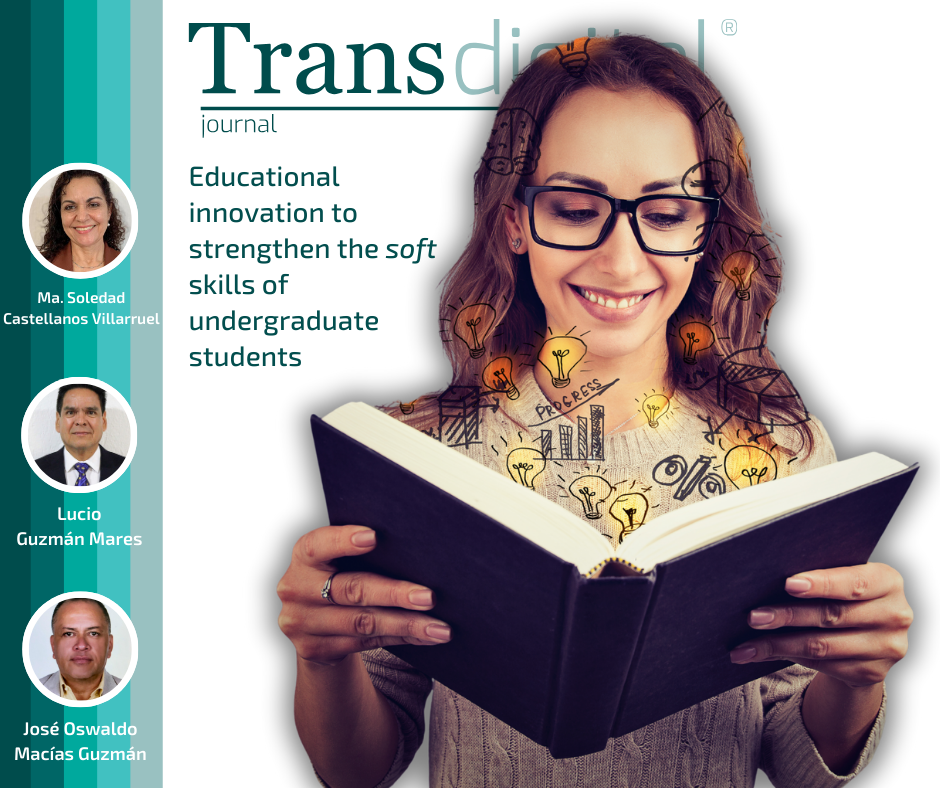Educational innovation to strengthen the soft skills of undergraduate students
DOI:
https://doi.org/10.56162/transdigital267Keywords:
Innovation, soft skills, integral formation, innovative learningAbstract
Starting from the need that undergraduate students have to develop and strengthen soft skills, an innovative research-based learning project was put into operation at the Ciénega University Center of the University of Guadalajara. The purpose of the study was, mainly, to enhance students' soft skills that guarantee greater opportunities to enter the labor market professionally. The methodology was conducted with an inductive method with a qualitative descriptive and explanatory approach as it corresponds to a specific case. The population was taken from 2,506 students from six majors in Economic-Administrative Sciences and of them, the participating sample was 520 students enrolled in the administration degree in one school period. As the most relevant results, an increase in the index was achieved degree in the thesis modality, as well as the application of generic skills that promote leadership and creativity. In the 2019-2020 school year there was no record of research thesis work for the degree process, unlike the 2022-2023 cycle, more than forty degrees have been carried out in the Bachelor of Administration through the research thesis option. The participation of more than 200 students in early research projects, resilience and information and communication technologies can be added as important achievements of the initiative.
References
Cahyani, I. (2019). Optimizing Educational Innovation through Problem-based Learning: How Experiential Learning Approach works in Literacy and Language Development. International Journal of Advanced Science and Technology, 28(8), 383-400. http://sersc.org/journals/index.php/IJAST/article/view/567
Fuentes, C. (2012). Modelo Educativo para la Innovación del Aprendizaje. Universidad de Guadalajara.
Goleman, D. (2009). Working with emotional intelligence. Bantam Books.
Nova Herrera, A. J. (2017). Formación integral en la educación superior: análisis de contenido de discursos políticos. Praxis & Saber, 8(17), 181–200. https://doi.org/10.19053/22160159.v8.n17.2018.7206
Okoye, K., Nganji, J. T., & Hosseini, S. (2020). Learning analytics for educational innovation: A systematic mapping study of early indicators and success factors. International Journal of Computer Information Systems and Industrial Management Applications, 12, 138-154.
Palacios Núñez, M. L., Toribio López, A., & Deroncele Acosta, A. (2021). Innovación educativa en el desarrollo de aprendizajes relevantes: una revisión sistemática de literatura. Universidad y Sociedad, 13(5), 134-145. https://rus.ucf.edu.cu/index.php/rus/article/view/2219
Sola Fernández, M. (2016). ¿Por qué es necesario innovar?, En M. Fernández Navas & N. Alcaraz Salarirche (Coord.) Innovación educativa: más allá de la Ficción, 41-52. Piramide.
Universidad de Guadalajara (2023). Reglamento General de Titulación de 2023. https://titulacion.udg.mx/sites/default/files/RGT-Abril-2023.pdf

Downloads
Autor de correspondencia
El autor de correspodencia se identifica con el siguiente símbolo: *Published
How to Cite
License
Copyright (c) 2024 Ma. Soledad Castellanos Villarruel, Lucio Guzmán Mares, José Oswaldo Macías Guzmán

This work is licensed under a Creative Commons Attribution 4.0 International License.
All articles in Transdigital are licensed under a Creative Commons Attribution 4.0 International License. Authors hold the copyright and retain publishing rights without restrictions.









